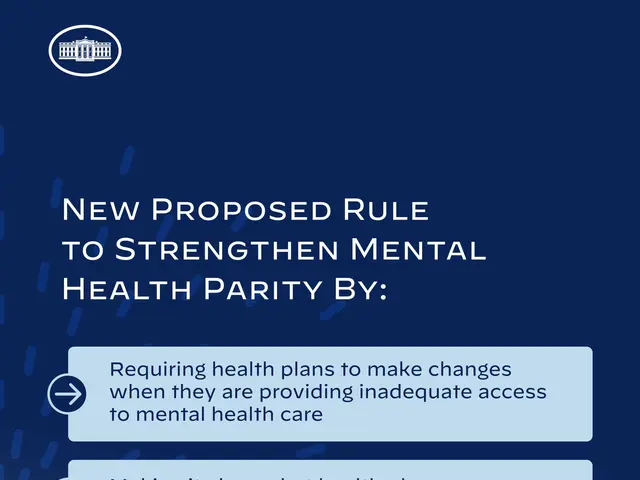Strategies for Safely Discontinuing Antidepressant Medications
In the journey of managing depression and anxiety, many patients may consider the possibility of trying a different antidepressant or even stopping their medication altogether. However, it's crucial to approach this decision thoughtfully and in consultation with a healthcare professional.
Firstly, if a patient wishes to try a different antidepressant, they should share their concerns with their doctor. It's essential to understand that anxiety and depression are chronic illnesses, and stopping treatment may result in a return of the illness [1]. If the patient successfully goes off their medication, their doctor may recommend going back on it or trying another one if the mental health issues return in the future [2].
When it comes to discontinuing antidepressants, it's important to remember the potential risk of discontinuation syndrome. This condition, which occurs while the brain is adjusting to being off antidepressants, can be avoided by setting a taper schedule with a doctor [3]. The doctor will help the patient chart a safe path for tapering off the antidepressant, typically by reducing the dosage over time [4].
Symptoms of discontinuation syndrome include anxiety, agitation, balance issues, flu-like symptoms, insomnia, nausea, sensory changes, and brain shocks or brains zaps [5]. If a patient is feeling better and emotionally stable, they may consider stopping their antidepressants. However, the length of the taper period can vary based on the antidepressant being taken and its dosage, as well as the patient's preference [6].
If a patient does not want to be on medication, they can discuss this with their doctor. If a patient prefers to stop taking antidepressants, they should communicate this preference to their doctor. In such cases, the doctor will help the patient develop a personalised tapering plan [7].
When tapering off antidepressants, it's important to remember that the process is gradual and requires careful monitoring. Patients should be monitored every 2-4 weeks during the taper. The tapering schedule can be paused or slowed if withdrawal symptoms or relapse of depression occur [8].
In addition to the tapering plan, patients are advised to maintain good hydration, nutrition, and sleep hygiene. They may also use symptom relief options like over-the-counter painkillers for headaches or prescribed anti-nausea medication, as recommended by their doctor [9].
It's also worth noting that if a patient is experiencing negative side effects from antidepressants, they should communicate these issues to their doctor. And if a patient cannot afford their antidepressant subscription, they should let their doctor know.
In conclusion, safely and effectively tapering off antidepressants with the help of a doctor involves gradual dose reduction over weeks to months, careful symptom monitoring, and personalized adjustments as needed. Close collaboration with a healthcare professional ensures safety and effectiveness throughout the tapering process.
References: [1] Coulter, A. (2021). Psychiatrist Andrew Coulter, MD, MA, shares considerations for going off antidepressants and what to communicate to a doctor. [online] Psychology Today. Available at: https://www.psychologytoday.com/us/blog/the-new-asylum/202109/going-off-antidepressants-what-you-need-know [2] American Psychiatric Association. (2018). Practice Guideline for the Treatment of Patients With Major Depressive Disorder. [online] Available at: https://www.psychiatry.org/psychiatrists/practice/dsm/dsm-5/major-depressive-disorder [3] National Institute of Mental Health. (2018). Depression. [online] Available at: https://www.nimh.nih.gov/health/topics/depression/index.shtml [4] National Institute of Mental Health. (2020). Discontinuation Syndrome. [online] Available at: https://www.nimh.nih.gov/health/topics/discontinuation-syndrome/index.shtml [5] National Institute of Mental Health. (2020). Medication for Depression. [online] Available at: https://www.nimh.nih.gov/health/topics/medication-for-depression/index.shtml [6] National Institute of Mental Health. (2020). Antidepressants and Depression. [online] Available at: https://www.nimh.nih.gov/health/topics/antidepressants-and-depression/index.shtml [7] National Institute of Mental Health. (2020). Depression: What You Need to Know. [online] Available at: https://www.nimh.nih.gov/health/publications/depression-what-you-need-to-know/index.shtml [8] National Institute of Mental Health. (2020). Treatment for Depression. [online] Available at: https://www.nimh.nih.gov/health/topics/treatments-for-depression/index.shtml [9] Mayo Clinic. (2021). Antidepressant withdrawal: Symptoms and treatment. [online] Available at: https://www.mayoclinic.org/diseases-conditions/depression/in-depth/antidepressant-withdrawal/art-20047490
- Maintaining good health and wellness while managing mental health issues like anxiety and depression often involves a collaborative approach with healthcare professionals, especially when it comes to decisions related to antidepressants.
- In the pursuit of understanding the history and science behind mental health treatments, exploring the impact of antidepressants on mental health and their potential withdrawal symptoms can provide valuable insights for both patients and healthcare providers.




